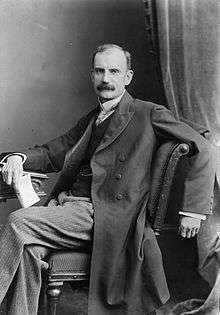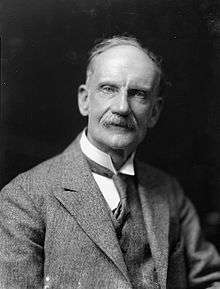William Pember Reeves
| The Honourable William Pember Reeves | |
|---|---|
 Portrait of William Pember Reeves possibly taken when he was elected to be a member of parliament in 1887 | |
| Minister of Labour | |
|
In office 1891–1896 | |
| Monarch | Queen Victoria |
| Prime Minister |
John Ballance Richard Seddon |
| 5th Agent-General to the United Kingdom | |
|
In office 1896–1905 | |
| Preceded by | Westby Perceval |
| 1st High Commissioner to the United Kingdom | |
|
In office 1905–1908 | |
| Succeeded by | William Hall-Jones |
| Personal details | |
| Born |
10 February 1857 Lyttelton, Canterbury Region, New Zealand |
| Died |
16 May 1932 (aged 75) London |
| Political party | Liberal |
| Spouse(s) | Magdalen Stuart Robison |
| Relations | William Reeves (father) |
| Children | Amber Reeves |
| Occupation | lawyer and journalist |
William Pember Reeves (10 February 1857 – 16 May 1932) was a New Zealand politician, historian and poet who promoted social reform.
Early life and career
Reeves's parents were William Reeves, who was a journalist and politician, and Ellen Reeves, née Pember. They had migrated from Britain to Canterbury Province in 1857, arriving three weeks before he was born.[1]
He was educated at a private "prep" school in Christchurch, the local high school and, from 1867 to 1874, Christ's College Grammar School.[2] Before entering politics, Reeves was a lawyer and journalist. He was editor of the Canterbury Times in 1885 and the Lyttelton Times (1889–1891).[3]
Political career
| Parliament of New Zealand | ||||
| Years | Term | Electorate | Party | |
| 1887–1890 | 10th | St Albans | Independent | |
| 1890–1893 | 11th | Christchurch | Liberal | |
| 1893–1896 | 12th | Christchurch | Liberal | |
Reeves represented the Christchurch electorate of St Albans in Parliament from 1887 to 1890, and then Christchurch from 1890 to 1896, when he resigned to take up the post of Agent General.[4] During the premierships of John Ballance (1891–93) and Richard Seddon (1893–1906) he served as Minister of Labour (1892–96), Minister of Education (1891–96), Minister of Justice (1891–92, 1893, 1895–96) and Commissioner of Stamp Duties (1892–96).[5] As Minister of Labour he introduced the Industrial Conciliation and Arbitration Act 1894 and the Undesirable Immigrants Exclusion Bill, which, if it had been passed, would have barred poor and Asian immigrants from the country. His opposition to the entry of those he considered "undesirable" immigrants earned him the nickname "Undesirable Bill" Reeves.[6]
In London
In January 1896 Reeves left New Zealand for London, where he was Agent General (1896–1905) and High Commissioner (1905–08). While he was in Britain Reeves became a friend of a number of left-wing intellectuals, such as George Bernard Shaw, H. G. Wells, and Sidney and Beatrice Webb, all leading members of the Fabian Society. He was also a member of the Coefficients dining club of social reformers.

Reeves became Director of the London School of Economics (1908–19) and President of the Anglo-Hellenic League (1913–25). He also headed the committee organising the First Universal Races Congress in London in 1911. Finally, he was chairman of the board of the National Bank of New Zealand from 1917 to 31.
Reeves's more influential writings include his history of New Zealand, The Long White Cloud (1898) and State Experiments in Australia and New Zealand (1902). He also published a number of poems, such as "The Passing of the Forest" and "A Colonist in his Garden".
Reeves married, in 1885, the feminist Magdalen Stuart Robison, who joined the Fabian Society. They had two daughters, the feminist writer Amber Reeves (born 1887) and Beryl (born 1889), and one son, Fabian Pember Reeves (1895–1917), who was killed in the First World War, aged 21, as a Flight Lieutenant in the RNAS.
Reeves three times declined offers of a knighthood.[3]
Notes
- ↑ Sinclair, Keith. "Reeves, William Pember". Dictionary of New Zealand Biography. Ministry for Culture and Heritage. Retrieved 13 April 2016.
- ↑ Keith Sinclair (2007). "REEVES, the Hon. William Pember". Encyclopedia of New Zealand 1966. Retrieved 2007-07-16.
- 1 2 16 July 2007
- ↑ Wilson 1985, p. 229.
- ↑ Wilson 1985, pp. 71–72.
- ↑ "Immigration regulation". teara.govt.nz. 2007. Retrieved 2007-07-16.
References
- Wilson, James Oakley (1985) [First ed. published 1913]. New Zealand Parliamentary Record, 1840–1984 (4th ed.). Wellington: V.R. Ward, Govt. Printer. OCLC 154283103.
External links
| Wikimedia Commons has media related to William Pember Reeves. |
| Wikisource has original works written by or about: William Pember Reeves |
- Biography in the 1966 Encyclopaedia of New Zealand
- Works by William Pember Reeves at Project Gutenberg
- Works by or about William Pember Reeves at Internet Archive
- The Long White Cloud at Project Gutenberg, or at the New Zealand Electronic Text Centre
- "The Passing of the Forest" at the New Zealand Electronic Text Centre
| Political offices | ||
|---|---|---|
| Preceded by Thomas William Hislop |
Minister of Education 1891–1896 |
Succeeded by William Campbell Walker |
| Preceded by William Russell |
Minister of Justice 1891–1892 1893 1895–1896 |
Succeeded by Alfred Cadman |
| Preceded by Alfred Cadman |
Succeeded by Alfred Cadman | |
| Preceded by Alfred Cadman |
Succeeded by William Hall-Jones | |
| New Zealand Parliament | ||
| Preceded by Francis James Garrick |
Member of Parliament for St Albans 1887–1890 |
In abeyance Title next held by Jack Watts |
| Vacant Constituency recreated after abolition in 1881 Title last held by Samuel Paull Andrews, Edward Richardson, Edward Cephas John Stevens |
Member of Parliament for Christchurch 1890–1896 Served alongside: Westby Perceval (1890–1891), Richard Molesworth Taylor (1890–1893), Ebenezer Sandford (1891–1893), George John Smith and William Whitehouse Collins (1893–1896) |
Succeeded by George John Smith, William Whitehouse Collins, Charles Lewis |
| Diplomatic posts | ||
| Preceded by Westby Perceval |
Agent-General of New Zealand in the United Kingdom 1895–1905 |
Post abolished, replaced by High Commissioner of New Zealand to the United Kingdom |
| New title | High Commissioner of New Zealand to the United Kingdom 1905–1908 |
Succeeded by William Hall-Jones |
| Educational offices | ||
| Preceded by Halford Mackinder |
Director of the London School of Economics 1908–1919 |
Succeeded by William Beveridge |